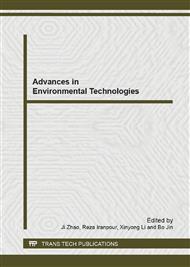p.2403
p.2409
p.2413
p.2418
p.2424
p.2428
p.2434
p.2441
p.2449
Isolation of One Strain for Biodegradation of Diesel Fuel from Sea Water
Abstract:
Four diesel fuel degrading microorganisms were isolated from soil and sea water from Crude Oil Terminal at Tianjin Port using diesel fuel as sole carbon source, and they all could degrade diesel fuel. The initial diesel fuel concentration in the culture medium was optimized and was 1.5 g/L. The ability of the four strains to degrade diesel was compared by spectrophotometer with the initial diesel concentration at 1.5 g/L. The results showed that the strain C1 had the highest degrading activity, which could degrade 32.59% of diesel in 7 days. The strain C1 was further identified by 16S rDNA sequence analysis as Rhodococcus erythropolis, and the phylogenetic tree of the strain C1 was constructed.
Info:
Periodical:
Pages:
2424-2427
Citation:
Online since:
August 2013
Authors:
Keywords:
Price:
Сopyright:
© 2013 Trans Tech Publications Ltd. All Rights Reserved
Share:
Citation:


